Films with theme "Films about Jews and Judaism", sorted by revenue

Love & Dance (2006)
, 1h35Origin Israel
Genres Drama
Themes Films about religion, Films about Jews and Judaism
Actors Evgenia Dodina, Avi Kushnir

Rock the Casbah (2012)
, 1h33Directed by Yariv Horowitz
Origin Israel
Genres Drama
Themes Films set in Africa, Films about religion, Political films, Films about Jews and Judaism
Actors Yon Tumarkin, Abdallah El Akal
During the First Intifada in 1989, Tomer, an eighteen-year-old Israeli soldier in Gaza, is sent to find a killers of a fellow soldier.
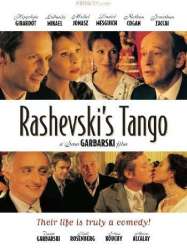
The Rashevski Tango (2003)
, 1h36Directed by Sam Garbarski
Origin France
Genres Drama, Comedy-drama
Themes Films about religion, Films about Jews and Judaism
Actors Hippolyte Girardot, Ludmila Mikaël, Michel Jonasz, Mosko Alkalai, Daniel Mesguich, Jonathan Zaccaï
La famille Rashevski est une famille juive ashkénaze qui ne pratique guère, mais lorsque la grand-mère Rosa meurt, sa famille la fait enterrer par un rabbin, car Rosa a pris une tombe dans le carré juif du cimetière. Mais qu'est-ce qu'être juif, et entre celui ou celle qu'on aime et ses racines doit-on trancher ? C'est ce que vont devoir se demander tous les personnages, pris entre leur histoire familiale, leur rapport au judaïsme et leurs amours.
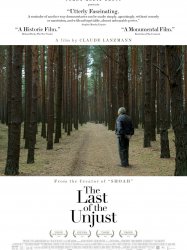
The Last of the Unjust (2013)
Directed by Claude Lanzmann
Origin France
Genres Documentary
Themes Films about racism, Films about religion, Documentary films about racism, Documentary films about law, Documentary films about war, Documentary films about historical events, Documentary films about religion, Political films, Films about Jews and Judaism, Documentary films about World War II
Actors Claude Lanzmann
Dans le cadre de ses travaux sur Shoah, Claude Lanzmann s'est longuement entretenu avec le rabbin Benjamin Murmelstein, au sujet de son rôle ambivalent comme haut fonctionnaire de la communauté juive de Vienne, contrôlée par Adolf Eichmann pendant la période nazie, et comme un « doyen juif » dans le camp de concentration de Terezín. En se filmant au présent sur les lieux évoqués dans les images de 1975, Lanzmann introduit une interrogation critique sur les moyens d'évoquer le passé au cinéma.

Israel, Why (1973)
, 3h5Directed by Claude Lanzmann
Origin France
Genres Documentary
Themes Films about religion, Documentary films about religion, Films about Jews and Judaism
Actors Claude Lanzmann
Pourquoi Israël (sans point d'interrogation) n'a pas de synopsis classique, ne raconte pas d'histoire, mais tente d’appréhender l'histoire d'Israël, vingt-cinq ans après la création de son État, au travers d'une succession d'images du pays et d'interviews de ses habitants. Tourné en 1972, le film, qui dure trois heures vingt, est présenté au 11e Film Festival de New York le 7 octobre 1973, soit le lendemain du déclenchement de la Guerre du Kippour.

Sweet Mud (2006)
, 1h37Origin Israel
Genres Drama
Themes Films about religion, Films about Jews and Judaism
Actors Henri Garcin
Set in 1974, Dvir (Tomer Steinhof) is soon to turn 13 and lives with his mother Miri (Ronit Yudkevitz) at a progressive kibbutz populated by people who take pride in their open-minded attitudes. However, they're not so easygoing when it comes to Miri; she's been sent to a mental hospital more than once, and her instability is more than most of the residents want to deal with, leaving Dvir to look after his mother with the help of his older brother Eyal (Pini Tavger). Miri persuades her Swiss boyfriend Stephan (Henri Garcin) to join her at the kibbutz, even though he isn't Jewish, but he isn't welcomed by other residents, and an unpleasant incident involving a neighbor's dog turns the couple into outcasts. In the midst of all this, Dvir is trying to prepare for his bar mitzvah, which at the kibbutz is combined with a severe regimen of survival training; he also gets a crash course in his ongoing maturity when he develops a crush on Maya (Daniel Kitsis), a cute girl his age.
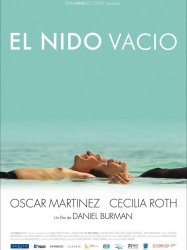
Empty Nest (2008)
, 1h31Directed by Daniel Burman
Origin Argentine
Genres Drama, Comedy-drama
Themes Films about religion, Films about Jews and Judaism
Actors Cecilia Roth, Inés Efron, Jean-Pierre Noher
The story is centered around a family of five, a father, mother, their two sons, and daughter, revolving around the father. The reality within the diegesis is the one of the father, Leonardo. The film plays with chronology and reality. Leonardo is a well-known writer and playwright, whose his wife left university studies to take care of the family. The film begins with a scene of a dinner in which Leonardo seems uncomfortable because, as is learned later in the film, he is witnessing a possible affair between his wife and an old college friend of hers. The film documents the troubles of the marriage as Leonardo has a brief affair with his dentist shortly after his youngest daughter leaves to Israel with her new husband Ianib. Leonardo's version of reality is, at many times, questionable during the film. He talks to a doctor that researches memory and they talk about the construction of memory and fantasy and it alludes to the self-reflexivity of the film. Leonardo's son in law Ianib leaves behind a book for him to read and asks for his opinion of it. Leonardo takes some time to actually read the book even though he carries it around for most of the film. When he finally reads the book, he is surprised to find out that it is brilliant. This scene is accompanied with a distinct use of lighting that focuses on Leonardo and his absorption within the novel.

Marry Me! Marry Me! (1968)
, 1h27Directed by Claude Berri
Origin France
Genres Drama, Comedy, Comedy-drama
Themes Films about religion, Films about Jews and Judaism
Actors Claude Berri, Élisabeth Wiener, Prudence Harrington, Louisa Colpeyn, Grégoire Aslan, Régine
Claude, un jeune juif d'extraction modeste et Isabelle, fille de diamantaires anversois, se rencontrent sur une plage en été. Lui rêve de famille, de femme et d'enfants. Elle ne pense qu'à s'amuser. Lorsque Isabelle tombe enceinte, Claude est poussé par les deux familles à l'épouser. Mais il fuit dans les bras d'une ravissante anglaise, Helen...

Birth of a Golem (1990)
Directed by Amos Gitaï
Origin Israel
Genres Drama
Themes Films about religion, Films about Jews and Judaism, Golem
Actors Dominique Sanda
C'est le premier volet d'une trilogie sur le golem, personnage mythique des légendes juives.

A Strange Course Of Events (2013)
, 1h40Directed by Raphaël Nadjari
Origin France
Genres Drama
Themes Films about religion, Films about Jews and Judaism
Actors Moni Moshonov
Saul is a matured man who is prone to avoid confrontations. One day he decides to visit his father who seems to suffer with a variety of issues and who usually blames the son for all his misfortune. Their first encounter after five years is rather alienating for Saul who discovers that his father is into yoga.

Amazing Grace (1992)
, 1h30Directed by Amos Guttman
Origin Israel
Genres Drama
Themes Medical-themed films, Films about religion, Films about sexuality, LGBT-related films, Films about Jews and Judaism, LGBT-related films, LGBT-related films about religion, HIV/AIDS in film, LGBT-related film
Actors Aki Avni, Rivka Michaeli
The young 'Jonathan' (Gal Heuberger) leaves his family's home in the Moshav, moves to "the big city" of Tel Aviv, to find an alienated and alone world. He falls in love with Thomas (Sharon Alexander), an HIV patient, and a touching and painful love story develops between the two.

Levy & Goliath (1987)
, 1h45Directed by Gérard Oury, Marc Monnet
Origin France
Genres Comedy, Adventure, Crime
Themes Films about religion, Films about sexuality, Erotic films, Films about prostitution, Transgender in film, Films about Jews and Judaism, Erotic thriller films, LGBT-related film
Actors Richard Anconina, Michel Boujenah, Maxime Leroux, Jean-Claude Brialy, Souad Amidou, Maurice Chevit
Albert (Michel Boujenah) et Moïse (Richard Anconina) Lévy sont issus du milieu juif ultra-orthodoxe d'Anvers mais ne se parlent plus depuis qu'Albert a quitté sa famille pour Paris où il a ouvert un café non-cachère et s'est marié avec Brigitte, une non-juive. Son frère Moïse, lui, respecte scrupuleusement les rites et coutumes juives, s’est marié dans les plus strictes règles, ne sort de son milieu que lorsque son métier d’ouvrier diamantaire l’y oblige et parle occasionnellement à Dieu, qui se révèle à lui au milieu de la fumée et de sons stridents. Goliath (Maxime Leroux) est garagiste et dealer.
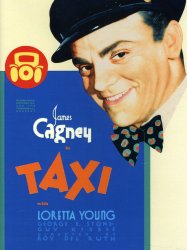
Taxi! (1932)
, 1h9Directed by Roy Del Ruth
Origin USA
Genres Drama, Crime, Romance
Themes Films about religion, Films about Jews and Judaism
Actors James Cagney, Loretta Young, George E. Stone, Guy Kibbee, Dorothy Burgess, David Landau
When a veteran cab driver, Pop Riley (Guy Kibbee), refuses to be pressured into surrendering his prime soliciting location outside a cafe, where his daughter works, the old man's cab is intentionally wrecked by a ruthless mob seeking to dominate the cab industry. Upon learning of the "accidental" destruction of his cab (and along with it his livelihood), the old man retrieves his handgun and shoots the bullying man known to be responsible, which lands him in prison, where he dies of poor health in fairly short order.

Judith and Holophernes (1909)
Directed by Louis Feuillade
Genres Drama
Themes Films about religion, Films based on the Bible, Films about Jews and Judaism
Actors Renée Carl, Léonce Perret, Alice Tissot, Maurice Vinot
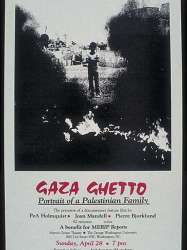
Gaza Ghetto (1984)
Genres Documentary
Themes Films set in Africa, Films about families, Films about immigration, Films about religion, Documentary films about law, Documentary films about war, Documentary films about historical events, Documentaire sur une personnalité, Documentary films about politics, Documentary films about religion, Political films, Films about Jews and Judaism
 Connection
Connection